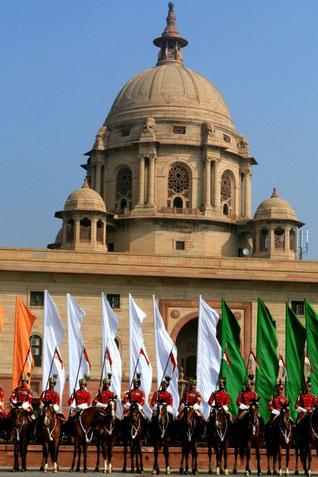 New Delhi, April 27: With two months left for the installation of the new President, the Congress has begun consultations with United Progressive Alliance (UPA) allies in the hope of achieving agreement on a common name. Defence Minister A.K. Antony will be flying down to Chennai shortly to meet Dravida Munnetra Kazagham president M. Karunanidhi to discuss the coming presidential elections, senior Congress sources said.
New Delhi, April 27: With two months left for the installation of the new President, the Congress has begun consultations with United Progressive Alliance (UPA) allies in the hope of achieving agreement on a common name. Defence Minister A.K. Antony will be flying down to Chennai shortly to meet Dravida Munnetra Kazagham president M. Karunanidhi to discuss the coming presidential elections, senior Congress sources said.
And when West Bengal Chief Minister Mamata Banerjee arrives here on May 4/5 for talks between the Centre and the States on the contentious National Counter Terrorism Centre (NCTC), she is likely to meet Congress president Sonia Gandhi on the subject of the next President, according to senior Congress sources.
Mamata-SP envoy meet
Ms. Banerjee recently met Samajwadi Party (SP) supremo Mulayam Singh Yadav's envoy, Kiranmay Nanda, on the issue, leading to speculation that the regional parties would try and force a name of their choice on the Congress. After this meeting, a section in the Congress, angered by the episode, began to say the party could get Vice-President Hamid Ansari elected President with the help of the Left parties even if the Trinamool decided to support some other candidate. But, of course, if the Congress were to do that, the Trinamool would not be able to continue in the UPA. “The Congress has to first get its own partners on board,” party sources stressed.
Pawar's clarification
On Thursday, Union Agriculture Minister and Nationalist Congress Party (NCP) leader Sharad Pawar met Ms. Sonia Gandhi at her invitation: he is believed to have clarified to her that he had not said that he was in favour of a non-political President — what was important was that there should be consensus on a name.
In the first round of talks, the Congress is hoping to get the green signal on a common name from all its major partners, starting with the Trinamool, the DMK and the NCP — which have the largest chunk of votes after the Congress in the UPA. In the second part of this exercise, the Congress will begin discussions with parties that are supporting it from outside, especially the vote-rich SP and Mayawati's Bahujan Samaj Party.
In the final round, the Congress will talk to the opposition parties because it is still working to avoid a contest. But party sources have made it clear that the name that appears to be emanating from the Bharatiya Janata Party (BJP) circles — that of former President A.P.J. Abdul Kalam — is unacceptable to it. If the BJP insists on that name, there will be a contest, Congress sources stressed.
However, even as Delhi is swirling with the names of presidential probables, the Congress is holding its cards close to its chest. In the end, it could even be a name currently not in circulation.





Comments
Add new comment